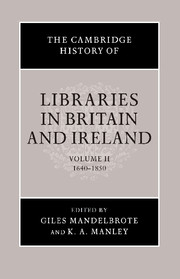Book contents
- Frontmatter
- 1 Introduction: the changing world of libraries – from cloister to hearth
- PART ONE THE EXPANSION OF BOOK COLLECTIONS 1640–1750
- PART TWO LIBRARY DEVELOPMENT AT A LOCAL LEVEL
- PART THREE PROVINCIAL AND METROPOLITAN LIBRARIES 1750–1850
- 18 Libraries in context: social, cultural and intellectual background
- 19 The book trade and libraries
- 20 Ecclesiastical libraries
- 21 Libraries in the parish
- 22 Books and universities
- 23 Libraries and literacy in popular education
- 24 Scientific and medical libraries: the rise of the institution
- 25 The first century of the British Museum library
- 26 The impact of the British Museum library
- 27 Private libraries in the age of bibliomania
- 28 Library architecture and interiors
- 29 Library management in the pre-professional age
- 30 Libraries for an imperial power
- 31 Engines of literature: libraries in an era of expansion and transition
- Select bibliography
- Index
- References
20 - Ecclesiastical libraries
from PART THREE - PROVINCIAL AND METROPOLITAN LIBRARIES 1750–1850
Published online by Cambridge University Press: 28 March 2008
- Frontmatter
- 1 Introduction: the changing world of libraries – from cloister to hearth
- PART ONE THE EXPANSION OF BOOK COLLECTIONS 1640–1750
- PART TWO LIBRARY DEVELOPMENT AT A LOCAL LEVEL
- PART THREE PROVINCIAL AND METROPOLITAN LIBRARIES 1750–1850
- 18 Libraries in context: social, cultural and intellectual background
- 19 The book trade and libraries
- 20 Ecclesiastical libraries
- 21 Libraries in the parish
- 22 Books and universities
- 23 Libraries and literacy in popular education
- 24 Scientific and medical libraries: the rise of the institution
- 25 The first century of the British Museum library
- 26 The impact of the British Museum library
- 27 Private libraries in the age of bibliomania
- 28 Library architecture and interiors
- 29 Library management in the pre-professional age
- 30 Libraries for an imperial power
- 31 Engines of literature: libraries in an era of expansion and transition
- Select bibliography
- Index
- References
Summary
The late eighteenth century has the reputation of being at best a fallow one in the history of ecclesiastical libraries. Many institutions had a major founder or benefactor in the seventeenth or early eighteenth century, but interest in them was beginning to decline by 1750. Often their histories contain strange gaps, or such statements as: ‘Interest having lapsed about 1750 it does not appear to have been restored until 1833.’ Perhaps the greatest library disaster of the period was the almost complete destruction of Bristol Cathedral’s books during the Reform Bill riots of 1831. But the effects of change would have been felt by all libraries by the end of this period. In 1750 it is still sometimes difficult to define an ecclesiastical library; many libraries still had some connection with a religious institution or benefactor, even if their reading matter and their readers were increasingly secular. By 1850 this was no longer the case: libraries, for so long nurtured by the church, had finally grown up and taken wing.
For the great English cathedral libraries this was a time in which they came to be regarded less as repositories of pure ‘divinity’ and increasingly as centres for historical research. Beriah Botfield has given an invaluable picture of these libraries in the 1830s and 1840s, of which he confidently states that ‘no where else can be found any collected account of the Ecclesiastical Libraries, attached to the Cathedrals of England’, which is certainly true: even 127 years later their story was still ‘strangely neglected’.
- Type
- Chapter
- Information
- The Cambridge History of Libraries in Britain and Ireland , pp. 313 - 323Publisher: Cambridge University PressPrint publication year: 2006

